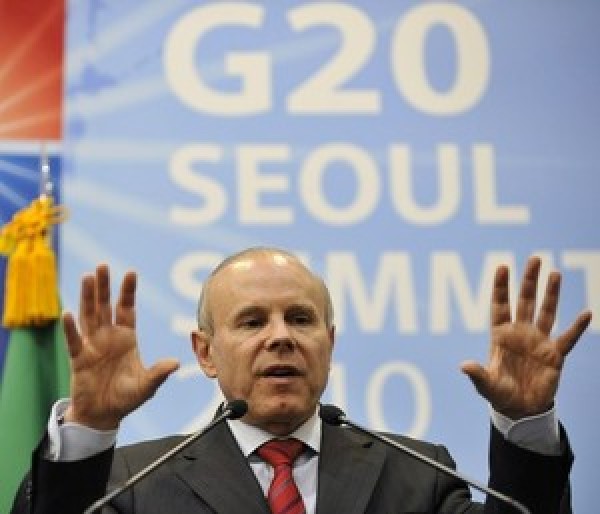
Brazil’s Finance Minister Guido Mantega delivers his address at a press conference on the sidelines of the final day of the G20 summit in Seoul on November 12, 2010. G20 leaders vowed on November 12 to avoid tit-for-tat currency devaluations, but China’s strong objections to any brakes on its export machine undermined a US push to redress skewed global trade. AFP PHOTO / ROMEO GACAD (Photo credit should read ROMEO GACAD/AFP/Getty Images); Forbes.com
At a Foreign Policy Association event in April 2010, former Brazil Central Bank President Arminio Fraga gave a rather intoxicating assessment of global central bank stimulus efforts to stem economic crisis. Fraga asked each audience member to imagine a night when he or she may have gotten ridiculously drunk. A rather tiring, hungover morning would follow as would a desperate solution – downing a bottle of whiskey to subdue the hangover. Fraga had been accepting an award and deserved some leeway (those are pretty much his exact words). However, his message came across – stimulus money can represent the excess credit that led to defaults the world over.
I had a stroke of good luck at this event – FPA Member Kathleen Murray unexpectedly invited me to do my Fellowship with the FPA. Fraga’s speech comes back to me because of Brazil’s recent credit riot. When I started working at Deutsche Bank in 2006, credit for car loans, mortgages and the like equaled 30% of GDP. The wealthy borrowed. Today, this figure is 50% of GDP.[1] Banks’ share of past due loans is at a record high. Government banks are making it easier to obtain loans, and the Central Bank’s policy rate is at 8%, down from 12.5% last year.
The credit is meant to help revitalize an economy that dove from 7.5% real growth in 2010 to 2.7% last year, and contracted in the first three months of 2012. My Latin America Person of the Year for 2011, Finance Minister Guido Mantega, has extolled Brazil’s weakening currency as a key to industrial growth. Lower interest rates do the weakening. Mantega has also suggested lowering bank reserve requirements – my reaction to that is yikes as Brazil’s reserve system has maintained well-capitalized banks throughout the global downturn.
Spiraling mortgages and souring loans are the drawbacks of using loose credit to aid the economy. As many commentators say, the Brazilian government needs to refocus its fiscal priorities. The welfare state and burgeoning government agencies are costly. The Economist decries a “Brazil cost” of public pensions and convoluted tax requirements.[2]
Brazil would be well-served by more government investment in infrastructure, and some of this is coming for the 2014 World Cup and 2016 Olympics. Transporting manufactured products is expensive. A number of philosophical policy changes would help as well – Brazil’s minimum wage is significantly higher than Indonesia or Vietnam, both manufacturing hubs. Additionally, state oil company Petrobras is executing a $224 billion capital spending program to develop Brazil’s massive pre-salt offshore oil fields. However, profits for the company and its investors will be crimped by an edict requiring that most equipment for the project be made in Brazil (Petrobras is listed on the São Paulo and New York Stock Exchanges).
On the flip side, Brazil’s economy is still relatively robust. Unemployment is low, and the nation received $67 billion in foreign direct investment last year. China likes Brazil’s trove of commodities – wouldn’t the European Union love to have all that oil? Lower interest rates have not fostered higher inflation, and Mantega says the economy will eclipse last year’s growth rate.[3]
So far, it appears that Brazil’s borrowing spike is not likely to lead to a disastrous debt crisis like that of the US and Europe. Rather, the outcome may be that Brazil’s economy just doesn’t achieve the high growth rates it could reach. While banks remain well-capitalized, loan write-offs will increase. Furthermore, a hallmark of the Rousseff and Lula presidencies has been lifting citizens out of poverty. The growing economy played a central role.